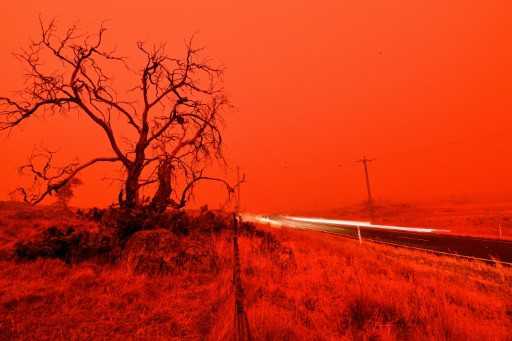2020 weather disasters boosted by climate change: report
29 December, 2020

The 10 costliest weather disasters worldwide this season saw insured damages worth $150 billion, topping the figure for 2019 and reflecting a long-term impact of global warming, according to a report Monday.
The same disasters claimed at least 3,500 lives and displaced a lot more than 13.5 million people.
From Australia's out-of-control wildfires in January to a record number of Atlantic hurricanes through November, the real cost of the year's climate-enhanced calamities was actually far higher because most losses were uninsured.
Not surprisingly, the responsibility fell disproportionately in poor nations, in line with the gross annual tally from global NGO Christian Aid, entitled "Count the expense of 2020: a yr of climate breakdown".
Simply four percent of economical losses from climate-impacted extreme events in low-income countries were insured, compared with 60 percent in high-income economies, the report said, citing a study last month in The Lancet.
"Whether floods found in Asia, locusts found in Africa, or storms found in Europe and the Americas, environment change has continuing to rage in 2020," explained Christian Aid's climate policy business lead, Kat Kramer.
Extreme weather condition disasters, of course, have plagued humanity long before manmade global warming commenced to wreck havoc on the planet's climate system.
But more than a century of temperature and precipitation info, along with decades of satellite data on hurricanes and sea level rise, have gone without doubt that Earth's warming surface temperature is amplifying their impact.
Significant tropical storms -- variously known as hurricanes, typhoons and cyclones -- are now more likely, for instance, to be stronger, go longer, carry even more water and wander beyond their traditional range.
2020's record-breaking 30 named Atlantic hurricanes -- with at least 400 fatalities and $41 billion in damages -- recommend the world could find more such storms as well.
The World Meteorological Organization (WMO) had to use Greek symbols after running out of letters in the Latin alphabet.
Extremes, not averages
Intense summer flooding found in China and India, where in fact the monsoon period brought abnormal amounts of rainfall for the next year running, are also consistent with projections how climate will influence precipitation.
Five of the very most costly extreme weather events found in 2020 were linked to Asia's unusually rainy monsoon.
"The 2020 flood was among the worst in the annals of Bangladesh, greater than a one fourth of the country was under normal water," said Shahjahan Mondal, director of the Institute of Flood and Normal water Operations at the Bangladesh University of Engineering and Technology.
Wildfires that scorched record areas found in California, Australia and even Russia's Siberian hinterland, a lot of it within the Arctic Circle, are also regular with a warmer universe, and a good predicted to worsen as temperatures climb.
The planet's average surface temperature has truly gone up at least 1.1 degrees Celsius typically compared to the later 19th-century, with much of that warming occurring within the last half-century.
The 2015 Paris Agreement enjoins the world's nations to collectively cap global warming at "well below" 2C, and even 1.5C if feasible.
A landmark article in 2018 from the U.N.'s IPCC weather science advisory panel confirmed that 1.5C is a safer threshold, but the probability of staying below it have grown vanishingly little, according to many experts.
"Ultimately, the impacts of environment change will be felt via the extremes, and not average adjustments," noted Sarah Perkins-Kilpatrick, a good senior lecturer at the University of New South Wales' Climate Transformation Research Centre.
If the growing frequency and intensity of natural weather disasters is constant with modeling projections, the brand new discipline of attribution science is now able to put lots on how much more likely such an celebration is because of global warming.
The unprecedented wildfires that destroyed 20 percent of Australia's forests and killed tens of an incredible number of wild animals in past due 2019 and early 2020, for example, were built at least 30 percent more likely, according to analyze led by Friederike Otto at the University of Oxford's Environmental Change Institute.
In European countries, meanwhile, the opportunity of deadly heatwaves occurring has risen nearly 100 fold in comparison to a century ago, according to new research.
"Heatwaves and floods that used to come to be 'once in a good century' events have become more regular occurrences," mentioned WMO Secretary-General Petteri Taalas.
Source: japantoday.com
TAG(s):
